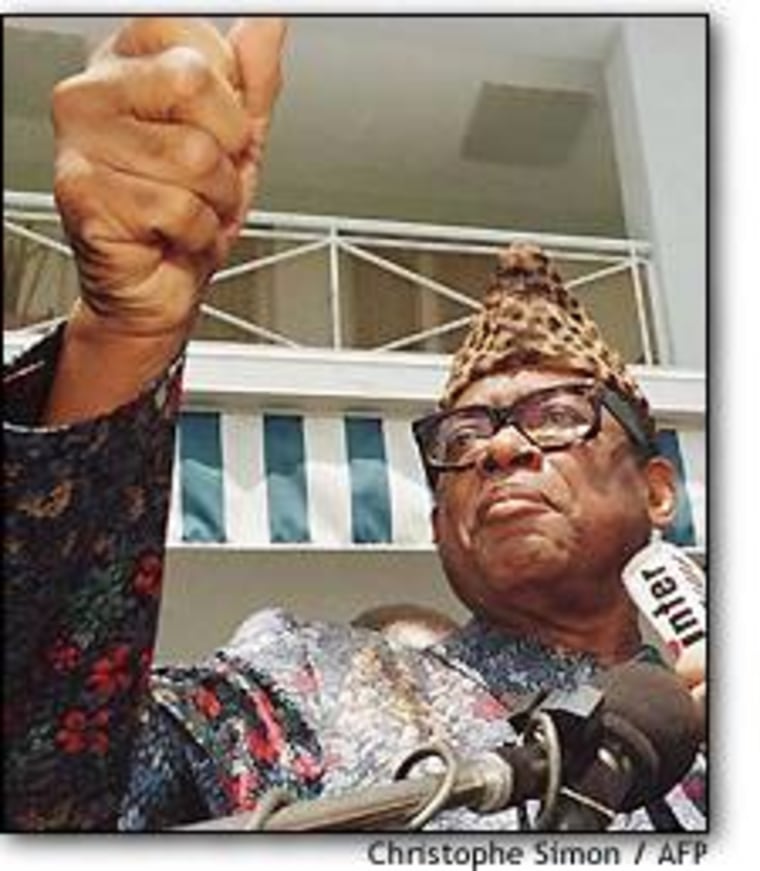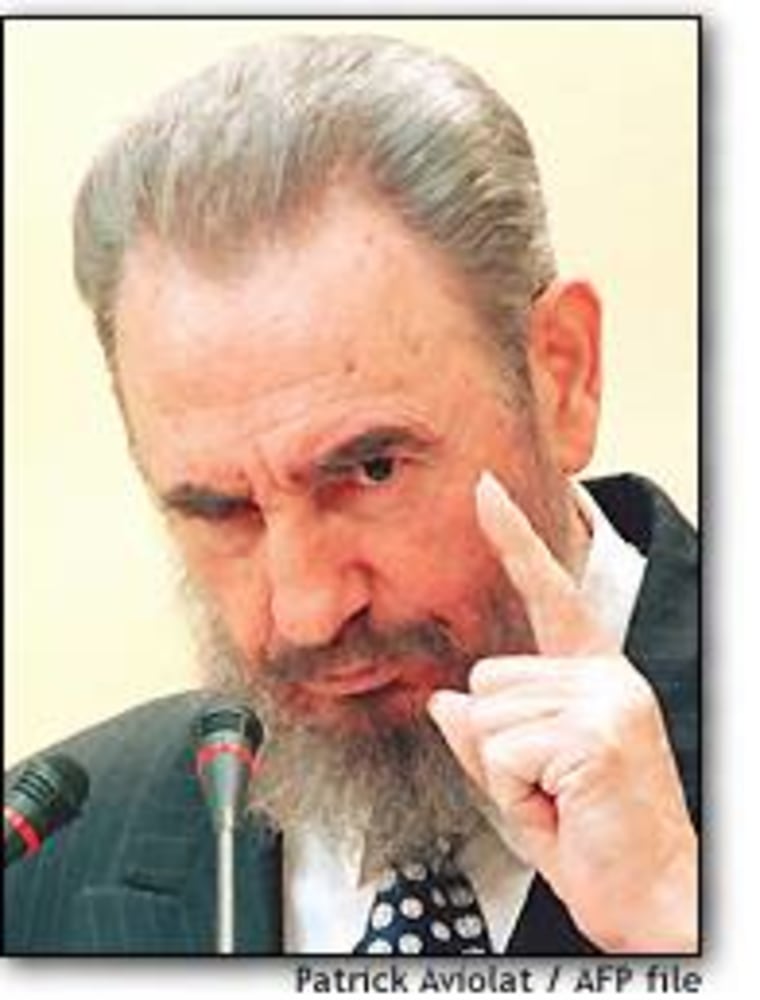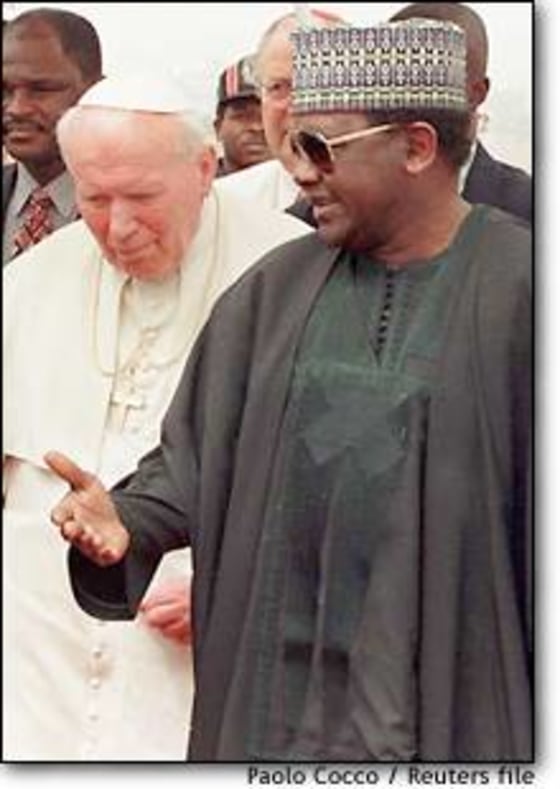Speaking ill of the dead is always a bit of a risk, but sometimes risks are worth taking. So it is with Nigeria’s tyrannical military ruler Gen. Sani Abacha, a man who abused his people and used his nation’s oil wealth to buy the acquiescence of the United States and Europe to his murderous ways.
WHATEVER HAPPENS in the wake of his death, even if it is ugly, it would be wrong to mourn him. So let’s enjoy the moment before it passes.
In just over six months this year, two of the planet’s most bloody and notorious despots have lost their grip on power. Abacha’s sudden and apparently all-too-painless death by heart attack Monday follows the ouster of Indonesia’s President Suharto by just over two weeks. In that short period, 277 million people — 186 million in Indonesia, 91 million in Nigeria — have been freed of the hated despot that misruled them.
True, there is no guarantee that either nation will produce an enlightened successor. And in Nigeria, the threat of anarchy hangs heavy in the air. Yet, throwing in the death of Pol Pot in March, it is hard to conclude the planet is not at least a little better off.
WHO’S NEXT AND WHY?
Rather than recount with glee the 34 reasons we should all be glad Abacha is gone, let’s look ahead at the list of lingering despots who may soon join Mobutu, Suharto, Abacha and the Soviet politburo on the ash heap of history. Here’s a quick glimpse of the most likely candidates.
Slobodan Milosevic: Next to Saddam Hussein, there is probably no better example of a despot who has played the world’s sole remaining superpower for a fool than Milosevic. Almost single-handedly, he drove Serbia and Montenegro into ruinous wars with Croatia and then, most notoriously, Bosnia. Having caused tens of thousands of deaths, he then turned “state’s witness,” threw his Bosnian Serb puppets to the wolves and renewed a racist campaign against Kosovo’s ethnic Albanians inside his own borders. In this he succeeded in turning a peaceful drive for autonomy in Kosovo into a full-fledged armed separatist campaign.
Serbs showed in the street protests of December 1996 that they have tired of Milosevic. Through backroom deals and repression, however, he has remained in power.
But the recent push in Kosovo should be Milosevic’s Waterloo. The West has looked the other way on the basis of him being one of the “guarantors” of the Dayton accords. The killing in Kosovo now threatens Europe in a way Bosnia never did — a war that crosses international borders. Serbia’s economy is in no condition for a new round of sanctions, but that is just what is on order. Milosevic is unlikely to survive another challenge from the streets.
Robert Mugabe: To be fair,Zimbabwe’s founding father is no despot, he is more a democratically elected autocrat. After 15 years in power, he won a 1995 vote fairly. But his regime has not developed the reflexes of a democracy. Security forces regularly intimidate opposition figures. Death in police detention is frequent, though human rights groups believe harsh conditions rather than torture are the cause.

Until recently, the goodwill remaining from Mugabe’s leadership of the independence struggle appeared to insulate him from such complaints. But since last year, the country’s economy has been on a slide. First students, and then labor unions took to the streets to protest what they call a corrupt regime.
Mugabe’s government has responded by banning protests in the capital, Harare, and by closing the University of Zimbabwe. Labor unions are speaking of a general strike and Mugabe’s allies are clearly worried. Much of the country is now too young to remember him as the hero of the independence struggle. That has traditionally been a turning point for African strongmen.
Aleksandr Lukashenko: Belarus is an often-overlooked nation sandwiched between Ukraine and Russia, and it is overlooked for a good reason: Everyone is embarrassed by the erratic and despotic conduct of its president, Alexander Lukashenko.
Since winning a 1994 election and hijacking Belarus’ small pro-democracy movement, he has jailed and beaten up opponents, expelled international “meddlers” like the Soros Foundation and amended the constitution to give himself unassailable powers. On Monday, in a dispute over utility lines, he ordered the gates of the U.S. ambassador’s residence welded shut.
Lukashenko so far has survived off of the largesse of Belarus’ big brother, Boris Yeltsin. That won’t last much longer. A much-ballyhooed defense-and-economic union between the two Slavic countries — a desperate attempt by Moscow to retaliate for NATO’s eastern expansion — never took root. What passes for an economy in Belarus is all but prostrate.
U.S. intelligence insists Lukashenko can’t last long without help from Russia, and particularly from Russia’s internal security organs.
Gen. Than Shwe: Than Shwe is the barely human face of the repressive clique that rules Burma. The regime has survived for years by a mix of heroin smuggling, covert Chinese support, Western acquiescence and a generally spineless reaction of its neighbors in Asia (who, for instance, welcomed Burma into ASEAN last year). Until recently, Burma’s junta seemed too isolated to be pressured into any kind of change — an excuse the United States has used for more than a decade to avoid seriously challenging it.
But Asia’s economic crisis, which has produced enormous suffering for the region’s poor, has a silver lining. Burma’s repression was more tolerable when Suharto and other nondemocratic Asian leaders were riding high and hiding their repression behind the term “Asian values.” With the fall of Suharto and the exposure of the unbelievable corruption and rot that was just beneath the surface of Asia’s economic boom, tolerance and hard currency for Burma has dried up. Western intelligence officials say that Burma’s democratic opposition, led by Nobel Prize winner Aung San Suu Kyi, has remained cohesive and motivated. These officials expect the generals to be out on the streets themselves by the turn of the century.
TOUGHER NUTS TO CRACK Fidel Castro:
The demise of Cuba’s longtime “maximum leader” has been predicted by the CIA so many times that its become something of a joke. These days, it is widely accepted that his age, 77, is far more likely to bring change in Cuba than any political movement. Like everyone, though, Castro will die. And what then? Do the Miami exiles flock home and reopen the casinos?

Not likely. Unlike most despots, Castro has managed to hold paranoia at bay, at least in regard to his brother, Raul. That means that Cuba, unlike Suharto’s Indonesia, Abacha’s Nigeria or Burma’s generals, has a succession worked out.
This fact has tempered Cuba observers, even the hawkish CIA, into revising the estimates of Castro’s impending fall that were going around in 1993. A U.S. intelligence official told me that current thinking is that Castro’s regime will outlive him in the person of Raul.
Saddam Hussein: “Anyone who claims that Saddam is weakening right now is just lying,” a British diplomat tells me. “Since the last flare-up with the West, Saddam has tightened his grip on power and he seems more in control than ever.”
As in Cuba, where Americans debate whether sanctions prolong or undermine the Castro regime, each clash with Saddam appears to make him politically stronger even as it weakens his abused population.
The cat-and-mouse game the Iraqi leader is playing with U.N. inspectors also has done little to weaken him. By the admission of Richard Butler, the chief U.N. inspector, Iraq retains the capability to build weapons of mass destruction — perhaps even Scud missiles. In the meantime, the dragging out of the process has frayed and fractured what was once called “the Gulf coalition.” Holding the allies together through successive showdowns with Saddam requires an ever-increasing expenditure of political energy and defense money by Washington.
Kim Jong Il: Like both Saddam and Castro, the North Korean leader has been counted out many times. In 1996, U.S. and Japanese intelligence estimates were talking in terms of “six months” before the collapse of the regime.
Today, a South Korean official told me, “We see no chance at all that North Korea will do an East Germany,” in effect, that it will collapse into the hands of its rival. “The ideology of North Korea is so pervasive that its people will endure unbelievable hardship before turning against the government.”
Of course, one might have said the same about Enver Hoxha’s Albania in the 1980s or Nicolae Ceascescu’s Romania. But in North Korea, another factor has come into play.
That factor is Kim Dae Jung, the new South Korean president. Last week, the South Korean leader said he planned to lift economic sanctions against the North. He followed that up this week by asking the United States to do the same.
“What the South Koreans fear even more than war with the North,” said a former commander of U.S. forces in the Pacific, “is the complete collapse of the North and the refugee nightmare that would follow.” For now, in most expert opinions, the world will have to live with Kim Jong Il.
That is, of course, unless he goes the way of Sani Abacha.
International Editor Michael Moran writes a weekly column on foreign affairs for MSNBC.com.
